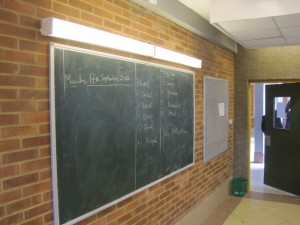I resumed the first class today at about 11am. The boys looked as curious as did those in my class of Yoruba more than two years before. I introduced myself, this time more firmly as I did earlier university students who at least had a disciplined look of adult learners. This time, teaching fourteen to sixteen year old Nigerian secondary school students will not turn out as easy as teaching seventeen to twenty-two year old American undergraduates. It was the first of three classes I would be teaching on the first day of term.
 I wrote my name on the board, along with a few exercises in spelling that was on the syllabus for the day. “I will be your teacher of English for the rest of the term.” I told them a few rules of the class, and stressed the importance of seriousness, then launched into a mini tirade that I had swirled in my head a few seconds before I walked in.
I wrote my name on the board, along with a few exercises in spelling that was on the syllabus for the day. “I will be your teacher of English for the rest of the term.” I told them a few rules of the class, and stressed the importance of seriousness, then launched into a mini tirade that I had swirled in my head a few seconds before I walked in.
“Now, to begin, let’s understand why, although already speakers of this language, you might need to pay very good attention to a class meant to teach you the basics of the rules that govern the language. If you think that because your parents have spoken it to you all your life you now know enough to be competent, please check that arrogance out the door right away. I have met a few Americans who had the same erroneous impression of their own speaking abilities. It ended in disaster…”
After a few minutes, and after I finally arrested their attention in the details of a new course that is being sold nearly as the cure for all that ailed them, we went into the spelling exercises. One of the words on the board was “gaol”.
“Who can pronounce this?”
Nearly everyone screamed: “gaaaaooll”.
“Wrong! You have just learned your first lesson in English. Words in this language are not always pronounced the way they are written. This word is pronounced the same as “jail”. It was an old way of writing it, before the Americans simplified it to “jail”. It also means the same thing.
We went down a list of a few other words: risqué, sachet, beret, tomb, bomb, pomade, breakfast, prayer, steak, and corps. Everyone knew how “steak” was pronounced, but very few knew about “corps” or “pomade”, or risqué.
“We will all need to get a dictionary.” I said.
Then I told them the story of a popular American president who had pronounced Navy Corpsmen as Navy Corpse-men several times in a televised speech. He was pilloried on cable television for days on end.
“Who was that president?” One student asked.
“Barack Obama,” I replied.
“Wooow!”
Whether that signified disappointment, or enlightenment, I am yet to find out, but the term is still very long, and it is still the first day of class.
1
Flo at http://inboxtranslation.com
It’s interesting how native speakers are sometimes less aware of their own language than those who learn it as a second language. I was reading one of your other articles (Amercia) and I think people need to pay more attention to the way they speak/ write. While I reckon that while speaking it is maybe a bit more difficult to avoid/ correct mistakes, in writing it’s unacceptable (from a little typo, inversion, omission etc. to the more serious grammar mistakes).
As you travel a lot, do you think this laid-back attitude towards one’s mother tongue is predominant in the US or have you noticed it elsewhere too?
Posted at September 23, 2012 on 8:14am.
2
Kola at http://www.ktravula.com
Hi Flo,
The issue of the “laid-back” attitude to proper use of mother tongue, I’ve found, is not common to America. If you read a few of the other pieces I have written on the matter over time, it is a common phenomenon. The number has grown so much of students in Nigeria who neither speak fluently their mother tongue, nor English. The problem, as I noted then, was that they did not consider the problem with the mother tongue as a problem. The educational policy of the country since the end of the military rule in Nigeria has unfortunately encouraged this lassitude. English has been given so much prominence at the expense of mother tongue education, and the result is a problem both with the mother tongue, and with English: lose-lose. The last time I raised the issue on twitter, it started a firestorm, and a few people suggested that even considering any education at the initial stage that doesn’t include the preeminence of English is a waste of time. I suspect that it is the same in the US, with less and less attention paid to English education, leading to disastrous results like “definately”, “moran”, “Your cool”, “I’m better then you”, among very many other phonetic/grammatical problems.
In short, to answer your question, it is a common problem.
Posted at September 23, 2012 on 2:46pm.